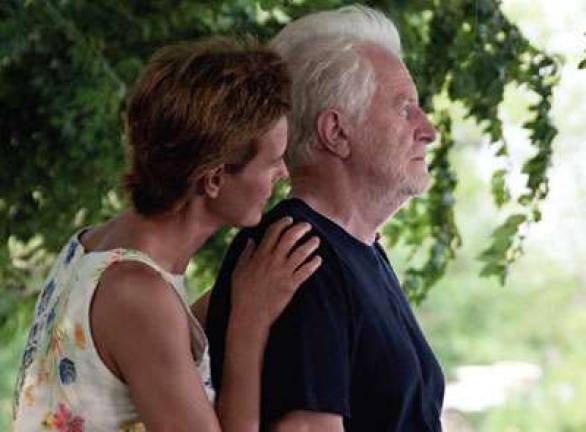Armond White's Mid-Year Awards

2012's best so far and Sarris remembered This year, I want to do the Mid-Year Reckoning differently, as a tribute to film critic Andrew Sarris' recent passing. It was Sarris, during my grad school years at Columbia, who wisely advised that the percentage of good movies has not changed from the old days; now that the output is larger, the significance of sifting out the trash is more important than ever. Sarris' indispensable work The American Cinema, first published in 1968, used the Nouvelle Vague's notion of auteurism (cinema authorship) to categorize all Hollywood film history up to that point. Sarris' commentary on over 200 directors was an awesome feat, combining scholarship with sharp perception. His extraordinary assessments should still structure anyone's thinking about movies, American or global. Because The American Cinema emerged from cinema's first half-century, it preserves aesthetics and values (pillars from Griffith to Sternberg) that have been lost in the recent years of criticism's decline, in which media and box-office presence is given importance over the individual visions that Sarris knew were what made cinema an art form. He articulated that belief with idiosyncratic precision that to this day-when both Hollywood and the critical "community" have lost self-respect-is still awesome to read. Each summer, my mid-year assessment has been a way to keep track of the movie year's deluge, which, given the dozen or more films that open every week, is more than can be reviewed. Perhaps the reckoning might this time benefit from following Sarris' model, as a reminder of the standards a film-lover has every right to uphold. I take great exception to the TV pundit whose memorial to Sarris cited that he "loved movies." Sarris' work was greater than any fanboy obsession-everybody "loves" movies, but Sarris turned his interest into teaching, study and personal expression, the things that make criticism valuable, an art in its own right. With continued respect for Sarris, one of the two critics who have meant the most to me, professionally and personally, I repeat The American Cinema's first nine top-tobottom categories, citing the work of individual directors. It could help to understand how 2012's best films so far might ultimately rank in film history or, as Sarris crucially demonstrated, in a personal pantheon rigorous enough to share with the world. Pantheon Directors Unforgivable (André Téchiné)-a tumultuous view of private lives as society and society as family. The Deep Blue Sea (Terence Davies)-examines the linkage of desire and despair to find the value of personal resurrection. The Far Side of Paradise Damsels in Distress (Whit Stillman)-the rare campus comedy genre visits private worlds that reflect the eccentricities we recognize deep down. Moonrise Kingdom (Wes Anderson)- compares the innocence of youth and maturity. Dark Horse (Todd Solondz)-tragedy found in the comedy of hopes squandered by misguided fashions. The Skinny (Patrik-Ian Polk)-clarifies the blur of sex and friendship that gay life faces straight-on. A Thousand Words (Brian Robbins)-a Hollywood satire so casually profound it scared off the industry and its fans. Expressive Esoterica Americano (Mathieu Demy)-an Oedipal odyssey that finds cultural heritage in family legacy. Ghost Rider: Spirit of Vengeance (Mark Neveldine and Brian Taylor)-addresses action movie tropes to satirize the deficiencies of contemporary genre excess. The Lady (Luc Besson)-eloquently acted political biopic, refined non-comic-book heroism. The Flowers of War (Zhang Yimou)-common tragedy and possibility, rapturously envisioned. Fringe Benefits Detention (Joseph Kahn)-traces moral chaos throughout recent pop history. Chronicle (Jonathan Trank)-youth's visionary search for meaning. Wanderlust (David Wain)-audacious mockery of Occupy sentimentality and its outdated hippie heritage. That's My Boy (Sean Anders)-empathy, heredity and its discontents. Joyful Noise (Todd Graff)-the anodyne effects of music and the movie musical. Less Than Meets the Eye Roadie (Michael Cuesta)-great performance by Ron Eldard. The Kid with a Bike (Dardennes brothers)- modern neuroses given fairytale attention. Abraham Lincoln: Vampire Hunter (Timur Bekmambetov)-trash made uncommonly spectacular. Lightly Likable: Being Flynn, Darling Companion, Man on a Ledge, Where Do We Go Now? Strained Seriousness: The Turin Horse, Safe, Neil Young Journeys, Magic Mike Make Way for the Clowns: Ted, The Dictator, Casa de mi Padre Oddities, One-Shots and Newcomers: Seeking a Friend for the End of the World, Beasts of the Southern Wild, Gerhard Richter Painting, Locked Out, John Carter To read more from City Arts [click here. ](http://cityarts.info)